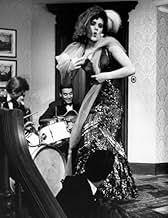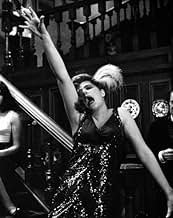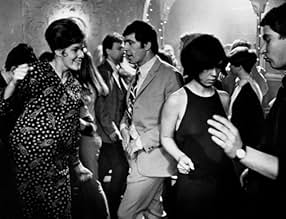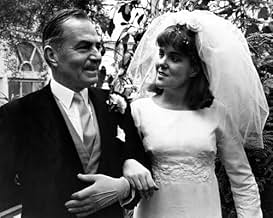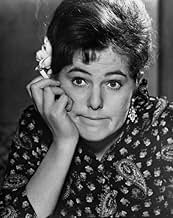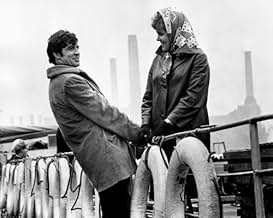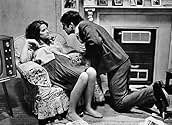IMDb RATING
6.9/10
4.5K
YOUR RATING
A young woman juggles an unwanted suitor's advances and her desire for an exciting life, envying her free-spirited roommate's social whirlwind.A young woman juggles an unwanted suitor's advances and her desire for an exciting life, envying her free-spirited roommate's social whirlwind.A young woman juggles an unwanted suitor's advances and her desire for an exciting life, envying her free-spirited roommate's social whirlwind.
- Nominated for 4 Oscars
- 6 wins & 17 nominations total
Jolyon Booth
- Registry Office Clerk
- (as Jolyan Booth)
Lewis Alexander
- Party Guest
- (uncredited)
Jack Arrow
- Party Guest
- (uncredited)
Richard Atherton
- Waiter
- (uncredited)
Roy Beck
- Party Guest
- (uncredited)
Hyma Beckley
- Party Guest
- (uncredited)
Featured reviews
Reviews seem to miss the real theme of this film, which is about the voyage of self-discovery of a person who feels out of sync with her world and tries to define, or redefine, her own true self. This theme has a strange attraction for me -- I identify with Georgy's search, I think, because of my own feelings of misalignment with the world or alienation. Unfortunately, as a male, it seems that the principal characters in films addressing this theme with sensitivity are invariably women. Perhaps in our society men are expected not to have such uncertainties about themselves or to suppress them, so no films are made. Two other films I enjoyed because of their similar themes are "Muriel's Wedding" and "Thelma and Louise". If you like, you can tell me I'm reading far more into this film than was ever intended, reminiscent of Mark Twain's famous warning. But you won't convince me! Alan
I watched this movie mostly for Lynn Redgrave, expecting nothing more than an old, light-hearted British comedy. It was better than I expected; "Georgy Girl" is a lovely, bittersweet dramedy clearly inspired by American screwball comedies of the 30's and the French New Wave that was burning in the 60's (to see how much the Nouvelle Vague aesthetics influenced British cinema, check the also remarkable "Two for the Road", with Albert Finney and Audrey Hepburn).
Redgrave, fantastic as usual, plays Georgy, a scatter-brained working-class virgin with a golden heart. She shares a flat with a selfish, cold bitch (Charlotte Rampling), who gets pregnant of Jos (Alan Bates), and the three of them eventually move together; but things get complicated as Georgy is courted by Jos and James (James Mason), a much older man, at the same time.
Bates (is it just me, or does he look like Jean-Paul Belmondo - one of the greatest Nouvelle Vague icons because of Godard's "Breathless" - in this?), Rampling and Mason are all great in their respective parts, but this is Redgrave's show all the way. Her anti-heroine is sweet and memorable, somewhat similar to Toni Collette's Muriel Heslop (from "Muriel's Wedding"), some sort of a British, less patient and clumsier Amélie Poulain (Audrey Tautou). Georgy singing "Whole Lotta Woman" is a classic scene. Lynn's performance alone would make this movie worth seeing, but she's not the only good thing about it, just the core. 10/10.
Redgrave, fantastic as usual, plays Georgy, a scatter-brained working-class virgin with a golden heart. She shares a flat with a selfish, cold bitch (Charlotte Rampling), who gets pregnant of Jos (Alan Bates), and the three of them eventually move together; but things get complicated as Georgy is courted by Jos and James (James Mason), a much older man, at the same time.
Bates (is it just me, or does he look like Jean-Paul Belmondo - one of the greatest Nouvelle Vague icons because of Godard's "Breathless" - in this?), Rampling and Mason are all great in their respective parts, but this is Redgrave's show all the way. Her anti-heroine is sweet and memorable, somewhat similar to Toni Collette's Muriel Heslop (from "Muriel's Wedding"), some sort of a British, less patient and clumsier Amélie Poulain (Audrey Tautou). Georgy singing "Whole Lotta Woman" is a classic scene. Lynn's performance alone would make this movie worth seeing, but she's not the only good thing about it, just the core. 10/10.
I enjoyed "Georgy Girl" at the time of its original release, but hadn't thought about it until I recently viewed the DVD version. This revisit was well worth it: "Georgy Girl" is a delightful film.
Charlotte Rampling's Meredith is my favorite of the four main characters. Rampling has always been physically stunning, but it's her moody intellect within that keeps Meredith modern rather than a 60s icon who looks sensational in Mary Quant mini-dresses, a darker version of Julie Christie in "Darling" (a character who didn't have too much of a light side herself). Meredith is cool, in control, self-serving, brutal, and surprisingly honest about who she is. "You take me as me," she tells Jos (Alan Bates) as she cajoles him into marrying her, not so much because she's pregnant but because she's bored. It seems in Meredith's view, you can easily get rid of a pregnancy, but boredom requires more skill and is potentially a worse situation in which to find yourself. Other actresses could have successfully made Meredith a bitch, but Rampling makes her fascinating and thus strangely likable. When she exits the film, things go a bit limp, but then there's little left than to move the story to its inevitable conclusion.
Alan Bates plays Jos with such high physical and verbal energy he seems to be all the Marx Brothers rolled into one. His facial expression at the culmination of his strip during the 'I Love You' sequence suggested to me a nod to the great Harpo.
Lynn Redgrave made the role of Georgy so much her own it's difficult to believe the story that Vanessa Redgrave had been originally intended for it -- and even more difficult to imagine Vanessa playing scenes with Rampling.
The title song became a big hit at the time. In the film, the lyrics vary somewhat from the pop version, serving to set up the plot during the opening credits and then comment on its resolution at the end. In between, the song politely vanishes, leaving the classically influenced score by Alexander Faris to take over with its harpsichord riffs and its subtle playfulness. I especially liked the violin solo that accompanies the transition from orgasm to morning sickness.
The dialogue is often fast, overlapping, thrown away, or contains obscure (to me) cultural references, so it's worth enabling the English subtitles for DVD viewing. You wouldn't want to miss "Moss Bros", or Alan Bates' rapid-fire disrobing monologue, or Meredith's contempt for the concert at which she has just played violin: "Beethoven night. They're like animals."
Charlotte Rampling's Meredith is my favorite of the four main characters. Rampling has always been physically stunning, but it's her moody intellect within that keeps Meredith modern rather than a 60s icon who looks sensational in Mary Quant mini-dresses, a darker version of Julie Christie in "Darling" (a character who didn't have too much of a light side herself). Meredith is cool, in control, self-serving, brutal, and surprisingly honest about who she is. "You take me as me," she tells Jos (Alan Bates) as she cajoles him into marrying her, not so much because she's pregnant but because she's bored. It seems in Meredith's view, you can easily get rid of a pregnancy, but boredom requires more skill and is potentially a worse situation in which to find yourself. Other actresses could have successfully made Meredith a bitch, but Rampling makes her fascinating and thus strangely likable. When she exits the film, things go a bit limp, but then there's little left than to move the story to its inevitable conclusion.
Alan Bates plays Jos with such high physical and verbal energy he seems to be all the Marx Brothers rolled into one. His facial expression at the culmination of his strip during the 'I Love You' sequence suggested to me a nod to the great Harpo.
Lynn Redgrave made the role of Georgy so much her own it's difficult to believe the story that Vanessa Redgrave had been originally intended for it -- and even more difficult to imagine Vanessa playing scenes with Rampling.
The title song became a big hit at the time. In the film, the lyrics vary somewhat from the pop version, serving to set up the plot during the opening credits and then comment on its resolution at the end. In between, the song politely vanishes, leaving the classically influenced score by Alexander Faris to take over with its harpsichord riffs and its subtle playfulness. I especially liked the violin solo that accompanies the transition from orgasm to morning sickness.
The dialogue is often fast, overlapping, thrown away, or contains obscure (to me) cultural references, so it's worth enabling the English subtitles for DVD viewing. You wouldn't want to miss "Moss Bros", or Alan Bates' rapid-fire disrobing monologue, or Meredith's contempt for the concert at which she has just played violin: "Beethoven night. They're like animals."
Alan Bates' eccentric performance outshines in this interesting and whimsical film. It is certainly an odd mix of drama and comedy as Bates never seems to act seriously around what essentially is a perverse story with cutting moments, particularly Charlotte Rampling's performance in the hospital after her baby is born. Redgrave is perfect as the dowdy and shy Georgie - like her description in the book, she appears plain but strangely attractive. Mason again appears as the downtrodden anti-hero, never quite getting what he wants at the end of the film - in this respect he always seems typecast. There's always something I like about these B/W 1960's films with their gritty London location filming and this one is no exception.
Good performances from Redgrave, Mason, Rampling and Bates. A modest film that found international approval. In 1966, while it may have seemed shocking to hear UK girl Charlotte Rampling tell Alan Bates that she had "destroyed" two of his already, it's worth remembering that an American girl couldn't have a legal abortion unless there were extenuating circumstances. Roe v. Wade was still several years away. The wholesome longings of Goergie are sharply contrasted with her roommate, the ice cold Meredith. The lead was originally offered to Vanessa Redgrave and when she backed out her younger sister Lynne was cast. She was overwhelmingly brave playing Georgie as a girl you liked enough that when she does something embarrassing you can't help but flinch. It happens a lot. As she falls and fails she finds a life of her own. And that is oddly inspirational.
Did you know
- TriviaVanessa Redgrave backed out of the role of Georgy just before shooting started. Her sister Lynn picked up the part instead.
- GoofsIn the early scene at the piano where Georgy's father has brought her a dress to wear to a birthday party, she's wearing glasses when he starts to say, "Oh, please yourself," but not wearing them before he finishes the line.
- ConnectionsFeatured in The Lady with the Torch (1999)
- How long is Georgy Girl?Powered by Alexa
- What is 'Georgy Girl' about?
- Is 'Georgy Girl' based on a book?
- How does the movie end?
Details
- Release date
- Country of origin
- Languages
- Also known as
- Georgy - En ploygirl
- Filming locations
- Dame Clara Butt House, 7 Harley Road, London, Greater London, England, UK(James Leamington's mansion)
- Production company
- See more company credits at IMDbPro
Box office
- Budget
- $400,000 (estimated)
- Runtime1 hour 39 minutes
- Color
Contribute to this page
Suggest an edit or add missing content



